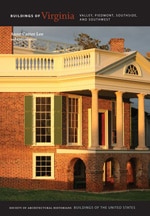
Pleasant Grove, an unusually intact plantation complex in an increasingly urbanized area, was built by and for Joseph Deyerle and his son James C. Deyerle, members of the Deyerle master builder-mason family that constructed many houses and churches in the region. James C. was primarily a builder, while his father, Joseph, a landowner, devoted most of his time to farming. The house is one of several substantial Greek Revival brick houses in Roanoke County—all with two stories, three bays, center-passage plans, and, generally, one-story, one-bay porticos with paired columns and an entablature. Unlike the others, Pleasant Grove does not have pilasters at the corners of the facade or an entablature. It alone has a cast-iron balcony above the Ionic portico and, like Buena Vista (RK44), is double-pile instead of the usual single-pile with a rear wing. Here and for at least some of the others, the carpenter was German immigrant Gustavus Sedon.
A number of brick outbuildings, probably constructed when the house was built, include an outside kitchen that was linked to the house in the 1960s and a gable-roofed springhouse with the usual overhang protecting the entrance. Behind the house, the brick slave quarters, a one-story-with-attic two-room structure, is partitioned down the middle, probably following the usual practice of housing one family on each side. Each side has an entrance and is heated by an end chimney. Also to the rear of the main house, a two-story smokehouse has a steep gable roof and is ventilated with slit openings.

